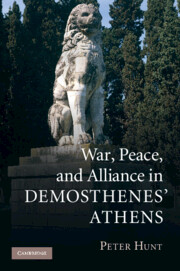Book contents
- Frontmatter
- Contents
- Acknowledgments
- Abbreviations, translations, and inscriptions
- 1 Introduction
- 2 Economics
- 3 Militarism
- 4 The unequal treatment of states
- 5 Household metaphors
- 6 Defense and attack
- 7 Calculations of interest
- 8 Reciprocity
- 9 Legalism
- 10 Peace
- 11 Conclusion
- Appendix 1 Speeches and texts
- Appendix 2 Plato and Aristotle on the causes of war
- Appendix 3 Claims of service
- References
- Index
5 - Household metaphors
Published online by Cambridge University Press: 05 May 2010
- Frontmatter
- Contents
- Acknowledgments
- Abbreviations, translations, and inscriptions
- 1 Introduction
- 2 Economics
- 3 Militarism
- 4 The unequal treatment of states
- 5 Household metaphors
- 6 Defense and attack
- 7 Calculations of interest
- 8 Reciprocity
- 9 Legalism
- 10 Peace
- 11 Conclusion
- Appendix 1 Speeches and texts
- Appendix 2 Plato and Aristotle on the causes of war
- Appendix 3 Claims of service
- References
- Index
Summary
One of the main themes of this book is the way that relationships between states were conceived of in terms of those within a society. Four aspects of this tendency deserve emphasis. First, it was quite natural: the abstract realm of relations between states – which only developed in the archaic period – was mapped onto the more concrete and long-established realm of relationships between individuals or families. Second, these analogies or metaphors allowed speakers on foreign policy to evoke the emotions and values associated with the internal relationships. Third, they seem to have been effective, to judge from their frequent use by expert orators. Finally, the ubiquitous application of internal metaphors to interstate conduct – like the influence of the economy and militarism – represents a path by which internal factors affected how Athens thought about and conducted itself in the world of states.
The most direct, simple, and emotional appeals of Athenian war rhetoric, the topic of this chapter, were based on the intimate and emotionally laden relationships within the house. Aristotle lists three relationships as constituting the Greek household: those between master and slave, between husband and wife, and between parents and children. The relationship of master and slave was metaphorically applied to the relationship of states in a class of arguments that encouraged intransigence in foreign policy: “fight for your freedom” or “to give in, even a little, would be slavish.
- Type
- Chapter
- Information
- War, Peace, and Alliance in Demosthenes' Athens , pp. 108 - 133Publisher: Cambridge University PressPrint publication year: 2010



